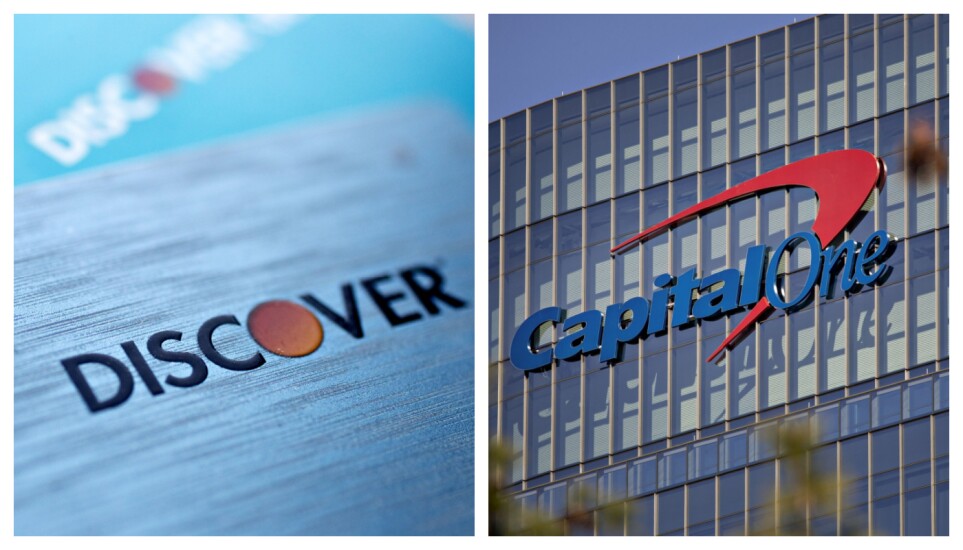In this month's roundup of top banking news: The potential impact of Capital One's purchase of Discover, the downfall of Heartland Tri-State Bank, New York Community Bank's succession planning and more.

Data breach affects 57,000 Bank of America accounts
An unauthorized party — apparently a ransomware group known as
The breach occurred Nov. 3, according to the letter, and Infosys McCamish notified Bank of America about the breach on Nov. 24.

What Capital One would get from buying Discover
Capital One Financial plans to acquire Discover in a $35.3 billion deal that would create a credit card behemoth with its own payments network.
The proposed merger of two of the six largest U.S. card issuers requires approval from federal regulators and is likely to invite heavy regulatory scrutiny. The companies, however, say the deal would help the Discover payments network compete against larger rivals such as Visa and Mastercard.

New York Community elevates former Flagstar CEO amid continuing turmoil
The actions came after the company's share price plunged by more than 59% over the last week.
The parent company of Flagstar Bank said the morning of Feb. 7 that Alessandro DiNello, the former president and CEO of Flagstar, who had been serving as nonexecutive chairman of New York Community, is now executive chairman of the $116.3 billion-asset company. DiNello was named nonexecutive chairman in December 2022, when

Ex-CEO of failed Kansas bank charged with embezzling $47 million
Beginning around May 30 and continuing through at least July 7, prosecutors said in court documents, Hanes embezzled funds from the $139 million-asset Heartland Tri-State and its customers "by causing at least 11 wire transfer financial transactions" from the bank. He "did not have authority to make the wire transfers or to use Heartland Tri-State Bank funds to purchase cryptocurrency."
The transfers ultimately resulted in investments that flopped and, by extension, in

Regulators push Citi to move faster on risk management fixes: Report
The $2.4 trillion-asset bank also recently failed exams by the Office of the Comptroller of the Currency, the report said. Those exams were meant to determine whether the company is advancing on data integrity as much as it says it is.

Capital One's Fairbank, eyeing 'holy grail,' takes a calculated risk
Some 35 years later, Fairbank's company could become the biggest credit card lender in America,
The proposed merger is already running into opposition from key consumer advocacy groups and Democratic lawmakers. Biden administration officials could ultimately block it. But the deal appears to be a calculated risk by Fairbank, who told analysts on Feb. 19 that

PNC promotes from within for president, sets up potential CEO successor
The $562 billion-asset company said on Feb. 20 that Michael Lyons has been promoted to president, succeeding William Demchak, who remains chairman and CEO. Lyons reports to Demchak and oversees PNC's primary operating lines of business. PNC's regional presidents will report to Lyons.
Lyons, 53, had been head of corporate and institutional banking since he joined Pittsburgh-based PNC in October 2011. During his tenure, Lyons helped lead PNC's

Truist selling last chunk of insurance business. Now what?
The Charlotte, North Carolina, company said on Feb. 20 that it has agreed to sell the remaining 80% of Truist Insurance Holdings to two private-equity firms and other investors. CEO Bill Rogers said on a call with analysts that the transaction —
"You've heard me talk a lot recently about the work being done at Truist to simplify our organization and to better control our expenses in our core businesses to drive improved performance in the future." Rogers said. "By selling [Truist Insurance Holdings], we'll have capital capacity to play more offense. … In addition, our significantly stronger balance sheet will be positioned to weather an even wider range of economic environments."

Banking-as-a-service banks: 'There is a reckoning'
"The number one takeaway for banks has to be that banking as a service is not the silver bullet many of them thought it would be for deposit gathering," said Jason Henrichs, founder and CEO of community bank consortium
Banks are

How BMO merged its technology with Bank of the West's
"For 13 months prior to regulatory approval, BMO was doing a ton of work with strategy sessions, but we were still competitors with Bank of the West, so we were not allowed to have any discussion about data," said Angela Sim, the chief technology resiliency, experience and operations officer at BMO. "The moment the regulators gave us the go was prime time for us to move very quickly."
When one bank acquires another, efforts to integrate technology must be put on hold until regulators have given the green light. Once that happens,





